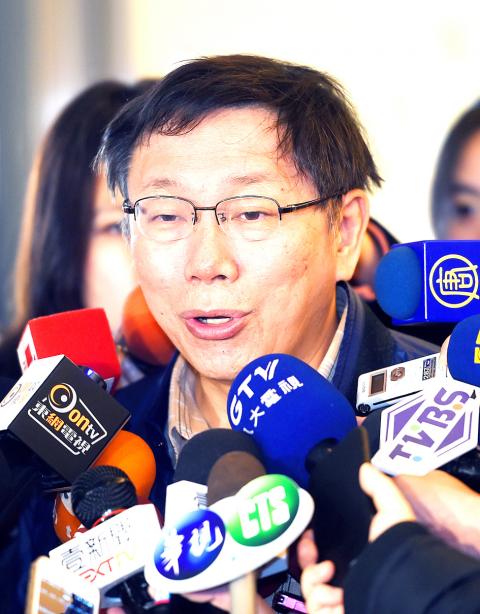Taipei Mayor Ko Wen-je (柯文哲) yesterday said his remarks made in a recent interview with Foreign Policy magazine were grossly misrepresented and asked that foreign reporters be more accurate when translating in the future.
In an online version of the interview published on Thursday, Ko was quoted as saying: “For the [world’s] four Chinese-speaking regions — Taiwan, Singapore, Hong Kong and Mainland China — the longer the colonization, the more advanced a place is.”
The reported statements have drawn flak from academics and legislators for overlooking the problems created by colonization.

Photo: Fang Pin-chao, Taipei Times
In response to reporters’ questions yesterday on the reactions to that statement, Ko said the idea he was trying to convey was that, with the rise of modern civilization, the longer a society comes into contact with a modern civilization, the more civilized it will become.
“How was that translated into: ‘The longer the colonization, the more advanced a place is.’ Good grief. They are miles apart,” Ko said on the sidelines of a book launch in Taipei that he attended.
Accurate translation should be ensured the next time foreign media outlets report, he said, adding that he would also reflect on how to answer questions more precisely.
Elaborating on his idea, Ko yesterday said that the rise of modern civilization was influenced by the Renaissance and began as Spain and Portugal discovered new sea routes around the globe. As such, the earlier a region is introduced to modern civilization, the more profound the influence, he said.
The main point of his remark was that a civilized society is not built overnight, Ko said.
“Habits such as stopping at red lights and going when the lights turn green and staying on the right side of the road take decades of education to foster,” he said.
He said that China, for example, was capable of boosting its GDP and developing nuclear energy in a short time, but the above habits that form part of a civilization in their subtle ways take a long time to enter the public consciousness.

AGING: As of last month, people aged 65 or older accounted for 20.06 percent of the total population and the number of couples who got married fell by 18,685 from 2024 Taiwan has surpassed South Korea as the country least willing to have children, with an annual crude birthrate of 4.62 per 1,000 people, Ministry of the Interior data showed yesterday. The nation was previously ranked the second-lowest country in terms of total fertility rate, or the average number of children a woman has in her lifetime. However, South Korea’s fertility rate began to recover from 2023, with total fertility rate rising from 0.72 and estimated to reach 0.82 to 0.85 by last year, and the crude birthrate projected at 6.7 per 1,000 people. Japan’s crude birthrate was projected to fall below six,

Conflict with Taiwan could leave China with “massive economic disruption, catastrophic military losses, significant social unrest, and devastating sanctions,” a US think tank said in a report released on Monday. The German Marshall Fund released a report titled If China Attacks Taiwan: The Consequences for China of “Minor Conflict” and “Major War” Scenarios. The report details the “massive” economic, military, social and international costs to China in the event of a minor conflict or major war with Taiwan, estimating that the Chinese People’s Liberation Army (PLA) could sustain losses of more than half of its active-duty ground forces, including 100,000 troops. Understanding Chinese

SELF-DEFENSE: Tokyo has accelerated its spending goal and its defense minister said the nation needs to discuss whether it should develop nuclear-powered submarines China is ramping up objections to what it sees as Japan’s desire to acquire nuclear weapons, despite Tokyo’s longstanding renunciation of such arms, deepening another fissure in the two neighbors’ increasingly tense ties. In what appears to be a concerted effort, China’s foreign and defense ministries issued statements on Thursday condemning alleged remilitarism efforts by Tokyo. The remarks came as two of the country’s top think tanks jointly issued a 29-page report framing actions by “right-wing forces” in Japan as posing a “serious threat” to world peace. While that report did not define “right-wing forces,” the Chinese Ministry of Foreign Affairs was

US President Donald Trump in an interview with the New York Times published on Thursday said that “it’s up to” Chinese President Xi Jinping (習近平) what China does on Taiwan, but that he would be “very unhappy” with a change in the “status quo.” “He [Xi] considers it to be a part of China, and that’s up to him what he’s going to be doing, but I’ve expressed to him that I would be very unhappy if he did that, and I don’t think he’ll do that. I hope he doesn’t do that,” Trump said. Trump made the comments in the context